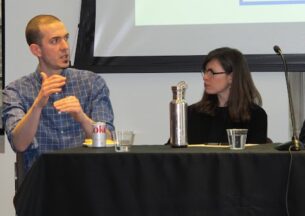Public Interest Technology Grant Funds and Expands CS/Harris Civic Data & Technology Clinic

A new grant from the Public Interest Technology University Network (PIT-UN) will support and expand the Civic Data & Technology Clinic, a new University of Chicago program that pairs student data scientists with non-profit organizations to work on projects in social and economic justice, sustainability, and climate change.
The project-based course started in Fall 2020 with funding from the 11th Hour Project, the grant-making arm of The Schmidt Family Foundation, and support from the Center for Data and Computing, the Harris School of Public Policy, the Social Sciences Division, and the M.S Program in Computational Analysis and Public Policy (MS-CAPP). The new PIT-UN grant will scale up the clinic for 2021, enabling new data science partnerships between students, researchers, and public sector and non-profit organizations.
“The Civic Data and Technology Clinic connects faculty and students with public interest organizations to help them leverage data science, research, and technology to address social challenges, while at the same time providing hands-on training for the next generation of civic technologists,” said Kathryn Mattie, program director of MS-CAPP. “These partnerships with public interest and government organizations empower these groups to use evidence-based and data-driven approaches to expand their impact.”
In the first two quarters of the Civic Data & Technology Clinic, students worked with organizations funded by the 11th Hour Project, such as Hohonu, which provides coastal monitoring that assists communities harmed by frequent flooding, and Inclusive Development International, which partners with local communities on economic justice protections. Projects drew upon data science, data visualization, machine learning, and other approaches to build an application to track palm oil deforestation, a system for informing the public about oil and gas industry effects on local air quality, and a real-time dashboard for predicting water level changes across the country.
A showcase event on March 29th will feature results from the Winter 2021 quarter, which continued developing projects started in the fall and launched new collaborations on recycling logistics and processing data about international development finance around the world. UChicago researchers, led by Daniel Grzenda, staff data scientist at CDAC, are also constructing an open-source platform at the Center for Data and Computing that provides data science tools and applications developed through the clinic for use by additional organizations and beyond their original purpose.
“The goal here is to really understand the model that allows for data science to continue in a sustainable way and succeed after the projects are over,” said David Uminsky, executive director for data science at the University of Chicago. “This is a really exciting opportunity to know that change is not just at the end of this quarter, but the change continues after the work was done.”
The grant will also fund a new assistant director position for the clinic, which is open for applications now.
The Public Interest Technology University Network (PIT-UN), which was convened in 2019 by the Ford Foundation, New America, and the Hewlett Foundation, is a partnership of 43 colleges and universities dedicated to building the nascent field of public interest technology, as well as growing a new generation of civic-minded technologists and digitally fluent policy leaders.
Public interest technology combines digital innovation and public policy. Already, universities across the United States have created joint degrees, exchange programs, and cross-disciplinary initiatives to begin to develop a robust pipeline of future technologists and leaders seeking to pursue careers in the growing field. One of the original members of PIT-UN, the University of Chicago has been a pioneer in the growing field of public interest technology, and one of the first to offer a degree at the intersection of public policy and computation.
PIT-UN previously awarded a grant to Christopher Berry of Harris Public Policy and Nicole Marwell of the UChicago School of Social Service Administration to support the development of a new course and book prospectus, aimed at addressing the new governance challenges posed by the 21st Century data explosion.
Support for this research was provided by the Public Interest Technology University Network Challenge Fund, a fiscally sponsored project of New Venture Fund. The Public Interest Technology University Network’s challenge grants are funded through the support of the Ford Foundation, Hewlett Foundation, Mastercard Impact Fund with support from Mastercard Center for Inclusive Growth, Patrick J. McGovern Foundation, The Raikes Foundation, Schmidt Futures and The Siegel Family Endowment.












